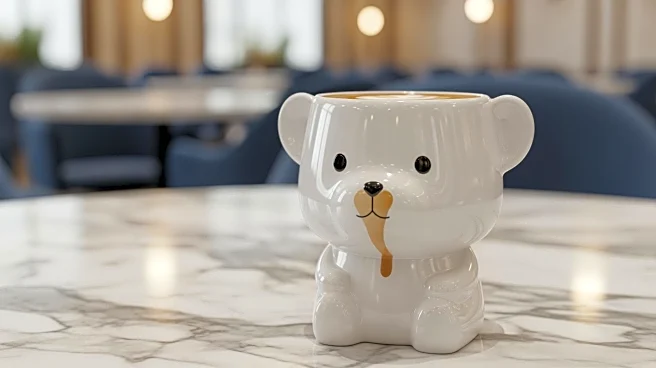What's Happening?
Starbucks recently launched its 'Bearista Cold Cup,' a limited edition 20-ounce cup shaped like a teddy bear, priced at $29.95. The product sold out within hours, leading to chaotic scenes in stores where
customers reportedly shoved each other to secure a purchase. Some customers expressed frustration after waiting in line only to see employees buy the cups themselves. The scarcity of the Bearista cup has led to a lucrative resale market, with some cups selling online for as much as $50,000. Starbucks issued an apology, acknowledging the unexpected demand and the disappointment caused by the limited availability. The company noted that it had shipped more Bearista cups than any other merchandise item this holiday season, yet they sold out quickly.
Why It's Important?
The Bearista cup phenomenon highlights the strong consumer demand for unique and limited edition products, even amid economic uncertainty. This trend underscores the psychological appeal of owning rare items, which can confer a sense of status and uniqueness. Starbucks' ability to create such demand reflects its successful branding and marketing strategies, which tap into consumer desires for small indulgences. The resale market for the Bearista cup also illustrates the potential for significant profit in secondary markets for popular merchandise. This situation may influence future retail strategies, encouraging companies to capitalize on exclusivity and scarcity to drive sales.
What's Next?
Starbucks may consider adjusting its production and distribution strategies for future limited edition merchandise to better meet consumer demand and avoid similar shortages. The company might also explore ways to manage resale markets, potentially implementing measures to limit bulk purchasing by individuals aiming to resell at inflated prices. Additionally, Starbucks could leverage the insights gained from this experience to enhance its marketing campaigns, focusing on the emotional and psychological aspects of consumer purchasing behavior. Retailers across various sectors may observe Starbucks' approach and apply similar tactics to their own product launches.
Beyond the Headlines
The Bearista cup craze raises questions about consumer behavior in times of economic uncertainty, where small luxuries become more significant. It also highlights the ethical considerations of employee purchasing practices and the impact on customer experience. The resale market's emergence points to broader issues of accessibility and fairness in consumer goods distribution. As companies increasingly rely on exclusivity to drive sales, they must balance demand with equitable access to products.










